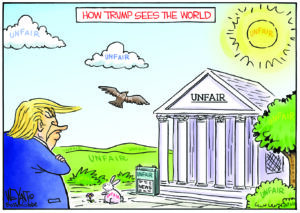Texans Face Soaring Levels of Toxic Pollution After Harvey
Oil refineries and petrochemical plants in Houston report the release of more than 2,700 tons of additional pollution—a result of Hurricane Harvey's damage. Smoke rises from a chemical plant in Crosby, near Houston, on Thursday, one day after two trailers of highly unstable compounds blew up after losing refrigeration. (KTRK via AP)
Smoke rises from a chemical plant in Crosby, near Houston, on Thursday, one day after two trailers of highly unstable compounds blew up after losing refrigeration. (KTRK via AP)
Houston residents are facing colossal levels of pollution as a result of the damage done by Hurricane Harvey. Oil refineries and petrochemical plants are reporting the release of more than 2,700 tons of extra pollution into the atmosphere, causing ozone levels in southwest Houston to soar to nearly triple the national standard.
“According to an analysis by the Center for Biological Diversity, a cocktail of nearly 1m pounds of particularly harmful substances such as benzene, hexane, sulfur dioxide, butadiene and xylene have been emitted by more than 60 petroleum industry plants operated by ExxonMobil, Shell, Chevron and other businesses since the hurricane,” The Guardian reports. “Residents living near the sprawling industrial facilities that dominate Houston’s ship channel said they have experienced pungent smells and respiratory issues in the wake of the hurricane.”
It continues:
The most spectacular industrial damage so far has taken place at the Arkema chemical plant in Crosby, Texas, where a number of explosions have been reported.
Many other petrochemical facilities have reported lesser but significant damage to their roofs and holding tanks from Harvey, the heaviest rain event in recorded US history. ExxonMobil had to shut down two facilities, with one damaged plant in Baytown releasing more than 12,500 lbs of chemicals including benzene and xylene.
Fourteen plants, operated by firms including Shell and Dow Chemical, have also reported wastewater overflows following the hurricane. It’s not yet clear what volume of pollutants has been released, although some scientists are concerned the huge volume of water washing through Houston will carry high levels of toxins. …
The US Environmental Protection Agency and the Texas Commission on Environmental Quality have said they have about 200 staff members working to monitor wastewater issues and safeguard drinking water.
“Everyone should avoid prolonged outdoor activity,” Matthew Tresaugue, who works with the Environmental Defense Fund on air quality in Houston, tweeted.
The Associated Press reported Saturday that the Environmental Protection Agency was “not on scene” in a number of areas where toxins have been released.
“Long a center of the nation’s petrochemical industry, the Houston metro has more than a dozen Superfund sites, designated by the Environmental Protection Agency as being among America’s most intensely contaminated places. Many are now flooded, with the risk that waters were stirring dangerous sediment,” AP writes. “The Associated Press visited seven Superfund sites in and around Houston during the flooding. All had been inundated with water; some were only accessible only by boat. EPA spokeswoman Amy Graham could not immediately provide details on when agency experts would inspect the Houston-area sites.”
The news of this added devastation comes as President Trump wraps up a meeting with Texans displaced by Hurricane Harvey. He did not touch upon the rise in pollution or lack of EPA presence, instead noting that “things are working out well.”
“They were just happy, we saw a lot of happiness,” Trump said of the evacuees he met with in Houston. “It’s been really nice, it’s been a wonderful thing … as tough as this was, it’s been a wonderful thing I think even for the country to watch and the world to watch, it’s been beautiful.”
Meanwhile, Houston residents attempting to deal with the aftermath of Harvey’s devastation fear for their health.
“This has been bad but it’s not going to get better, it’ll only get worse,” Jessica Hultze, a retired woman who lives in a Latino area of Houston, told The Guardian. “We all talk about how close we are to the refineries but for us there is no hope, we will die with this poisonous air … I’ve been around for a few years and no one has listened to us. We are just the little people.”
Your support matters…Independent journalism is under threat and overshadowed by heavily funded mainstream media.
You can help level the playing field. Become a member.
Your tax-deductible contribution keeps us digging beneath the headlines to give you thought-provoking, investigative reporting and analysis that unearths what's really happening- without compromise.
Give today to support our courageous, independent journalists.






You need to be a supporter to comment.
There are currently no responses to this article.
Be the first to respond.